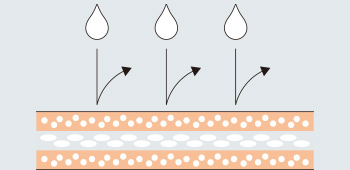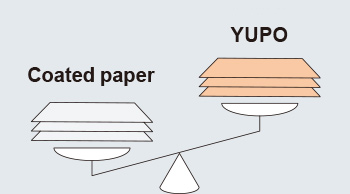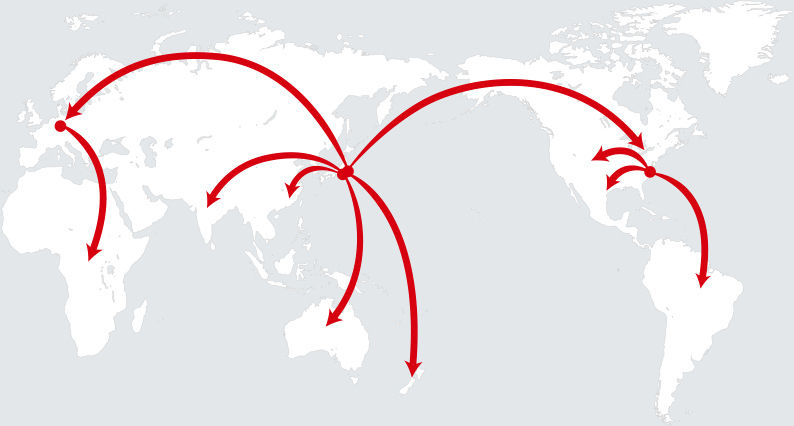YUPO's strengths
the both characteristics of paper and film


Proprietary manufacturing method
that has acquired many related patents in Japan and overseas
YUPO manufacturing method


Proprietary manufacturing method
that has acquired many related patents in Japan and overseas
YUPO is a strong and flexible "film synthetic paper" developed by a proprietary manufacturing method.
YUPO was developed as a "dream paper alternative to general paper" for the purpose of "protecting forest resources".
The primary raw materials of YUPO are synthetic resin "polypropylene *" and natural mineral "inorganic filler".
YUPO is manufactured from the above-mentioned primary raw materials with a small amount of additives, and as it is formed, micro-voids (tiny holes) are generated through a biaxial orienting film method.
Through this process, YUPO has the same characteristics of "water resistance and durability" as plastic films derived from the primary raw materials, but also has the suppleness, printability and suitability for handwriting of paper, thanks to the micro-voids.
This manufacturing method is based on our proprietary technology, and various patents related to YUPO have been issued in countries such as Japan, China, the United States, and Europe.
- * Polypropylene is a general-purpose synthetic resin (plastic) consisting of hydrogen and carbon. It is a clean material that can be recycled in various ways and emits no harmful substances when burned.
- Click here for more information


Realization of strength
in the base layer and characteristics in the surface layer
YUPO
structure


Realization of strength
in the base layer and characteristics in the surface layer
YUPO is a three-layer synthetic paper
with a base layer laminated with a surface layer.
Light is irregularly reflected by countless micro-voids (tiny holes) generated in the surface layer during the stretching process, realizing high whiteness, printability, suitability for handwriting, and light weight, while strength is ensured by the base layer.
YUPO's various characteristics are obtained by combining this three-layer structure and technology (core technology), and there are hundreds of product variations including sheets with different thicknesses.
- Click here for more information


Tougher than paper, more expressive than film
YUPO is known for its water resistance, but this is not the only benefit.
It has many features not found in other synthetic paper, and its versatility is YUPO's greatest attraction.
Much more than paper...






Much more than film...








Synthetic paper, as an ecological choice

Developed with the aim of replacing paper made of wood (pulp) with a new generation of paper,
YUPO contributes to environmental conservation and reduction of environmental impact in various ways.


Response to environment and safety
- YUPO and ALPHAYUPO do not use toxic substances or environmentally-harmful substances, such as heavy metals, asbestos, CFCs, halons, PCBs, PCTs, PBBs, phenols, formaldehyde, bromine flame retardants or plasticizers (phthalates), in the manufacturing process. In addition, the following substances, which are prohibited for manufacturing and import by Japanese law, are not used.
Chemical Substances Control Law (Class 1 Specified Chemicals), Occupational Health and Safety Law (Substances Prohibited for Manufacturing), and Poisonous and Deleterious Substances Control Law (Specified Toxins). - The above toxic substances and environmentally damaging substances are not used for YUPO manufacturing grade products, except for a portion of products.
YUPO is manufactured in factories that have acquired ISO14001 certification.
ISO14001 is an international standard for "Environmental Management Systems" that continuously improve the environmental impact caused by corporate activities.
Our KASHIMA FACTORY and research and development laboratory acquired this certification in March 2000. Based on our environmental policy, we work to save energy, recycle, reduce waste, and prevent pollution and accidents to contribute to the local community and the global environment.
- Click here for more information

Disposal of YUPO
Moreover, the primary raw material of YUPO is a polyolefin made of carbon and hydrogen. When properly incinerated in a public incinerator, no harmful substances such as chlorine-based gas, unpleasant odor, or soot are generated.
When disposing of YUPO as garbage at a business site, please dispose of it as industrial waste.

50 years of experience in 70 countries
Since the commencement of commercial production in 1971,
YUPO has constantly provided the domestic and international markets with the latest printing and processing technologies,
and has now grown into a leading brand of synthetic paper.
It performs according to user expectations in various environments around the world,
and at present, YUPO is used in more than 70 countries every day to meet the needs of people all over the world.

YUPO CORPORATION has a sales and marketing department with a thorough understanding of products and applications,
and a technical support department with knowledge on how to use YUPO (printing and post-processing).
Utilizing the know-how we have cultivated over 50 years of experience, we can provide prompt support from testing of YUPO to final product production.
In addition, we provide various solutions as a good partner that is closely aligned with customers
by cooperating with research and development laboratories and our parent company groups (Oji Holdings Corporation and Mitsubishi Chemical Corporation).


Please feel free to contact us.
Sample books and products of interest can be purchased through the sample request form.
Please feel free to contact us regarding any other inquiries.
Inquiries about products
Inquiries about the company or other matters
Hours: 9:00 to 12:00, 13:00 to 17:45
Japan Standard Time (excepting weekends and holidays)





